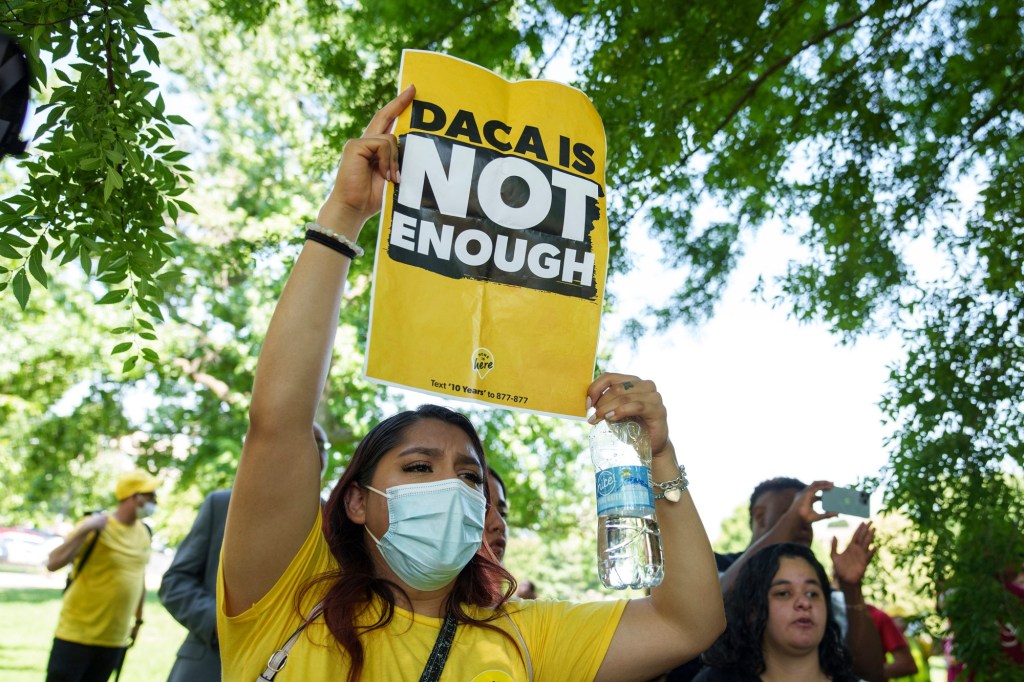
By Julie Appleby, KFF Health News
When open enrollment for the Affordable Care Act, or Obamacare, started nationwide Friday, a group that had previously been barred from signing up will be eligible for the first time: The “Dreamers.” That’s the name given to children brought to the United States without immigration paperwork who have since qualified for the Deferred Action for Childhood Arrivals program.
Under a Biden administration rule that has become contentious in some states, DACA recipients will be able to enroll in — and, if their income qualifies, receive premium subsidies for — Obamacare coverage. The government estimates that about 100,000 previously uninsured people out of the half-million DACA recipients might sign up starting Nov. 1, which is the sign-up season start date in all states except Idaho.
Yet the fate of the rule remains uncertain. It is being challenged in federal court by Kansas and 18 other states, including several in the South and Midwest, as well as Montana, New Hampshire, and North Dakota.
Separately, 19 states and the District of Columbia filed a brief in support of the Biden administration rule. Led by New Jersey, those states include many on the East and West coasts, including California, Colorado, Nevada, New Mexico, New York, Oregon, and Washington.
The rule, finalized in May, clarifies that those who qualify for DACA will be considered “lawfully present” for the purpose of enrolling in plans under the ACA, which are open to American citizens and lawfully present immigrants.
“The rule change is super important as it corrects a long-standing and erroneous exclusion of DACA recipients from ACA coverage,” said Nicholas Espíritu, a deputy legal director for the National Immigration Law Center, which has also filed briefs in support of the government rule.
President Barack Obama established DACA in June 2012 by executive action to protect from deportation and provide work authorization to some unauthorized residents brought to the U.S. as children by their families if they met certain requirements, including that they arrived before June 2007 and had completed high school, were attending school, or were a veteran.
States challenging the ACA rule say it will cause administrative and resource burdens as more people enroll, and that it will encourage additional people to remain in the U.S. when they don’t have permanent legal authorization. The lawsuit, filed in August in U.S. District Court for the District of North Dakota, seeks to postpone the rule’s effective date and overturn it, saying the expansion of the “lawfully present” definition by the Biden administration violates the law.
On Oct. 15, U.S. District Judge Daniel Traynor, who was appointed in 2019 by then-President Donald Trump, heard arguments in the case.
Plaintiff states are pushing for fast action, and it is possible a ruling will come in the days before open enrollment begins nationwide in November, said Zachary Baron, a legal expert at Georgetown Law, who helps manage the O’Neill Institute Health Care Litigation Tracker.
But the outlook is complicated.
For starters, in a legal battle like this, those who file a case must demonstrate the harm being alleged, such as additional costs the rule will force the states to absorb. There are only about 128 DACA recipients in North Dakota, where the case is being heard, and not all of them are likely to enroll in ACA insurance.
Furthermore, North Dakota is not among the states that run their own enrollment marketplace. It relies on the federal healthcare.gov site, which makes the legal burden harder to meet.
“Even though North Dakota does not pay any money to purchase ACA health care, they are still claiming somehow that they are harmed,” said Espíritu, at the immigration law center, which is representing several DACA recipients and CASA, a nonprofit immigrant advocacy group, in opposing the state efforts to overturn the rule.
During the hearing, Traynor focused on this issue and noted that a state running its own marketplace might be a better venue for such a case. He ordered the defendants to present more information by Oct. 29 and for North Dakota to respond by Nov. 12.

















































